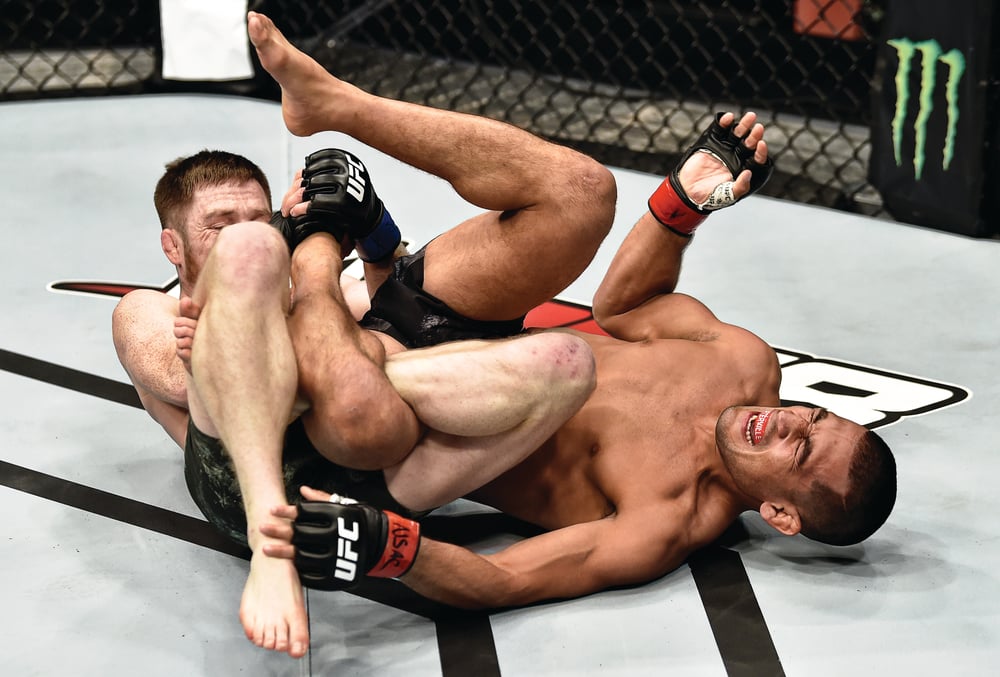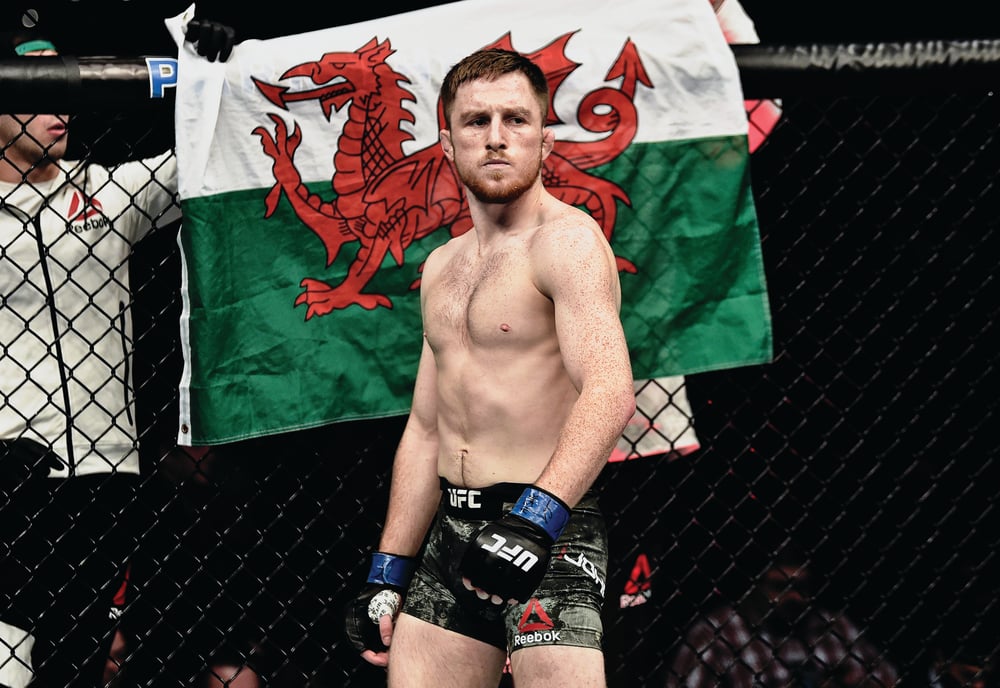
Issue 165
March 2018
Brett Jones has big ambitions in MMA, but won't let one of the best unbeaten records in the UFC take his feet off the ground.
Brett Johns is a realist. He knows his 15-fight undefeated run will one day come to an end. Most importantly of all, though, Brett Johns is a realist, because he knows about life and hardship and what it feels like to not only spend day after day training in a cold, lonely gym, but to also sleep there overnight.
Some will call him a pessimist, a killjoy, a doom-monger who always expects the worst to happen. But as the 25-year-old explains, he merely has a unique perspective on success.
Unreal result
Take, for example, his win over Joe Soto at the Ultimate Fighter 26 Finale in December. That, to most people, was the best kind of victory: produced inside just 30 seconds via a submission, and one rarely seen in the Octagon - a calf slicer.
The win grabbed people's attention, and landed the victor a 'Performance of the Night' bonus, too. It also spared Johns any damage and allowed him to go home early.
Yet ask the man in question about a lightning-quick triumph over a former Bellator champion and UFC title challenger, and he will offer you a very different take on what it actually all means.
“It’s a bit of a tough one,” says the Welshman. “People look at the performance and talk about the bonus. They say, ‘You won the fight in 30 seconds; you must feel awesome.’ But I don’t. I’m happy. The fight could have gone a lot worse. But I seem to be the opposite to a lot of these fighters in that I want a long, hard fight.
“I’ve been involved in some big wars in my time and I just seem to enjoy those types of fights more. Unfortunately, I didn’t get the war I wanted with Soto.
“Also, a big thing for me is experience. Joe Soto was meant to be the biggest test of my career, and I really wanted to find out how I would deal with him over 15 minutes. I didn’t get an opportunity. I got nothing in terms of experience, and I had a lot tricks up my sleeve.”

The one trick he did get the chance to show off – that aforementioned calf slicer – was soon the talk of the internet and came as a surprise not just to fans expecting a competitive fight between Johns and Soto, but to the victor himself, who admits he knew very little about it at the time.
“I didn’t even know what I did,” Johns adds. “In every fight, I have a blackout and don’t remember anything. I thought the Soto fight was three minutes long and I’d finished him with an armbar, not a calf slicer.
“Everybody watched that submission and it went viral. That was a big thing for me, because the more people that talk about you, the better.”
Here’s another reason Brett Johns is a realistic: back in March 2017, on the day he was supposed to appear on the same show as his “idol” Brad Pickett, in London, Johns received news his scheduled opponent, Ian Entwistle, had fallen ill following a struggle making weight and had been withdrawn from the fight.
Naturally, having watched and admired Pickett since he was 16, and having looked forward to the Entwistle fight for a number of weeks, the news hit Johns hard. It also made him appreciate the fragile, unpredictable nature of his chosen sport.
“I understand that people get hurt and fall ill in this game,” he says. “But that was one of my worst moments in MMA. I managed to get on the same card as my idol, Brad Pickett, and that was a big thing for me. I had the chance to fight on the final card he’d ever appear on, only for it to be taken away from me on the day of the fight... It absolutely killed me.”
He was heartbroken, but having sacrificed absolutely everything to make it to MMA’s big leagues, it would take more than a fight falling apart to make his dedication to his passion waver.
Working-class hero
Raised by a single mother in Swansea, Brett Johns started his sporting life as a judoka, having followed his older sister to the local club as a rambunctious four-year-old. It was there where he harnessed his energy, where he’d meet his sensei (who would later start a relationship with his mother) and where he’d often find himself embroiled in fights – not judo matches – with his younger brother. “We’d go for the judo and end up trying to kill each other,” is how ‘The Pikey’ describes those early scraps, before adding, “I was the quiet one. He was the nutcase.”
This was the way of it for Johns from the age of four to 16 – going to the club two to four times a week – and it wasn’t long before he forgot all about play-fighting with his brother and focused his attention on competing at the 2012 Olympic Games in London. Then, however, for perhaps the first time, Johns discovered he was a realist.
“When I was 16, I realized it was an unrealistic dream,” he explains. “I never really got any major results. I look back on those results and the best I got was a fifth in the UK under-20s. But I should have been getting fifth in the British Open, not the under-20s.
“I wasn’t the best in the UK, I wasn’t the best in Wales. I wasn’t even the best in my own gym! I just felt like there was the need for me to make a change.”
Up to this point, he’d shown an interest in MMA, but admits the idea of actually doing it was far less appealing. He watched all the events, knew all the fighters, and boasts of being a UFC encyclopedia. Yet it wasn’t until he went to his local MMA gym that Johns understood the extent of his passion for this exciting and dangerous sport.
“I was a young lad growing up in MMA,” he says. “I found it when I was 14 or 15 and I’d drink on a Friday, then go to the gym and train on a Saturday morning.
“But when I made that change from judo to MMA, a switch went o in my head. I was working as a laborer on a site and it killed me. I’d come on-site at half past seven and cry my eyes out. When people asked why I was upset, I’d tell them I know what I want and how to get it, but I can’t keep working as well.”

It was then, as his fledgling MMA career was starting to take off, that Brett Johns the realist made way, if only momentarily, for Brett Johns the opportunist. Against his better instincts, Johns surrendered himself to his MMA dream and decided to quit work.
“It was a huge risk,” he says. “My mother would work two or three jobs to look after me and my siblings. But my family realized I was good at this and supported me more and more.
“The first couple of months after finishing work was okay. I had a sponsor who would pay me a wage, and I’d give that straight to my mother for rent.
“But the relationship with the sponsor fell through, and then there was no money coming in. I told my mum I couldn’t afford to pay rent and stay with her anymore, but she didn’t bat an eyelid. She didn’t care. For me, it was humiliating that I couldn’t help my mother out, but she had a stance and that was that. At one point, I sold my car for £100 and gave the proceeds straight to my mother.”
Often Johns, rather than go home, would find himself staying behind at his local MMA gym in order to get a good night’s sleep. He’d push two sofas together, creating a makeshift bed, and fell asleep hoping nobody would find him.
“A lot of these fighters say they live in the gym, but they haven’t actually lived in the gym,” he says. “They haven’t spent all day and night there. Anyone who has will tell you it’s not a nice thing to have to do. It’s not a glamorous place to live. It killed me.”
It got worse before it got better too, as Johns, crippled by a shoulder injury, had to shell out £7,000 for it to be repaired. It was £7,000 he didn’t have, of course, which meant, to x the injury, he had to call upon a sponsor and his pad man, who were both happy to help and who, Johns is quick to stress, have since been paid back in full.
“Those hard days make me appreciate what I’ve got now,” he says. “Conor McGregor’s story and my story are very similar. But I’m a very proud man. Even through those hard times, I never went on the dole or went on benefits. I did it all o my own back. The reason why I did that was because I thought if I’m well enough to work, I should work. Why should I take other people’s money? I did it on my own.”
Local boy done good
When Johns finally received the call to fight in the UFC in 2016, the mentally tough Welshman, overcome by a mixture of delight, relief and vindication, broke down and cried. It wasn’t his Olympic dream coming to fruition, but it wasn’t far off. “Magical,” is how he describes the moment he learned there was a spot for him at UFC Fight Night 99 in Belfast.
Now, three fights into his Octagon run, Johns is creeping up on people. He’s climbed to 13th in the bantamweight rankings thanks to a 15- fight unbeaten run that is the envy of many of his peers. The only people in the UFC who can boast a bigger undefeated record are Khabib Nurmagomedov and fellow Brit, Darren Till.
“I’ve never been afraid to lose,” he says. “In fact, I always think about the negatives. I’m a realist. I know in the next two or three fights I could potentially lose. You can’t lie to yourself.
“When friends tell me I’ll win my next fight, or have an easy time with my opponent, I think, yeah, but you don’t know the guy like I know him. You don’t study him like I do.
“People say to me you learn from a loss. I bet you do. But you can learn from wins as well. You can learn from mistakes you make when winning. I need to keep winning to keep this momentum going.”
Do that and it won’t be long before Brett Johns finds himself in a big fight, perhaps even a title fight. It’s a vision the realist now sees in his future. It’s clear. It’s viable. Close enough to touch.
“I see those fights happening soon,” Johns says. “I look at the top 15 on paper and every one of them terrifies me. So what’s the difference between fighting number 15 and number one? They all scare me the same. They are all good guys. You wouldn’t want to fight any one of them, but if I’m going to fight one of them, I want the best in the division. I don’t see the big fights being too far away, maybe in the next six months. That’s what I have in mind. I’m a realist, but I will fight any man.”
...









